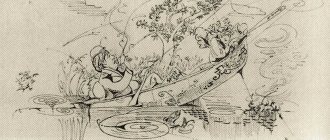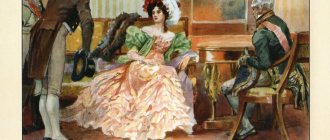Interesting words and expressions
Subscribe Free "Silver" newsletter.
Subscribers 813 RSS
| July 2021 | ||||||
| 1 | 2 | 3 | 4 | |||
| 5 | 6 | 7 | 8 | 9 | 10 | 11 |
| 12 | 13 | 14 | 15 | 16 | 17 | 18 |
| 19 | 20 | 21 | 22 | 23 | 24 | 25 |
| 26 | 27 | 28 | 29 | 30 | 31 | |
Haven't gone out once in the last 60 days
Mailing site: https://www.iknowit.ru/dicts/ Opened: 06/29/2008 Author's address
Author Alexey Shestopalov
Interesting words and expressions of the Russian language, stable phrases. Origin of idioms (phraseologisms).
Statistics
813 subscribers 0 per week
- Issues
- Statistics
Issues
Statistics
Interesting words and expressions: places not so remote and other passions
Subscribe
Places not so distant idiomatic expressions In the "Code on Punishments" of 1845, places of exile were divided into "remote" and "not so distant". By “remote” we meant the Siberian provinces and subsequently Sakhalin, by “not so remote” we meant Karelia, Vologda, Arkhangelsk regions and some other places located just a few days’ journey from St. Petersburg. Suffer bullshit sections: idiomatic expressions; general dictionary; If you look at it, there’s nothing indecent in the word “dick”...
2014-06-03 12:42:46 + Comment
Interesting words and expressions
Subscribe
Bartholomew's Night (Bartholomew's Night) idiomatic expressions The expression "Bartholomew's Night" has long been included in the languages of many peoples, meaning the cruel, treacherous murder of defenseless people who have no ability to resist. Its appearance was preceded by real events in France, when on the night of August 24, 1572 (St. Bartholomew's Day), Catholics carried out a brutal massacre of the Huguenots. In the 16th century, religious wars broke out in Europe, associated with fierce resistance to Catholicism...
2013-09-05 15:49:57 + Comment
Interesting words and expressions
Subscribe
The case smells like kerosene idiomatic expressions Koltsov's 1924 feuilleton talked about a major scam uncovered during the transfer of a concession to exploit oil in California. The most senior US officials were involved in the scam. It was here that the expression “the thing smells like kerosene” was used for the first time. All tryn-grass idiomatic expressions Everything is indifferent, nothing worries. The mysterious “tryn-grass” is not some kind of herbal medicine, so as not to worry. At first it was called &q...
2012-09-27 12:22:52 + Comment
Interesting words and expressions
Subscribe
Dol unit of measurement is the same as: dol In the forties of the twentieth century, a group of researchers from the famous American Cornell University began a series of works to create a pain scale. The lack of an objective indicator of pain still causes many problems for medicine: it is necessary to rely on purely subjective assessments like “not very painful,” “hurts,” and “very painful.” The goal was to develop a pain unit that would provide objective information about pain sensations regardless of their nature...
2012-07-19 16:44:34 + Comment
Sliding transition
So, you’ve captured the reader’s attention—all that’s left to do is keep it. The following techniques will help maintain reader interest even in materials on the most boring topics.
Answer your own question
Actually, this is a classic tool of rhetoric - the hypophora: first you ask a question, and then you answer it yourself. This technique is especially popular in political speechwriting. Here are common phrases:
- That's right
- You're right
- It's like that
- And you'll be right
- This is true
- What a score
- Without a doubt
- Yes, until recently it was like that
- So yes
- Yes, that is right!
- Yes, that's what I thought too
- I didn't think that
- Badly
- Not good
- You were unlucky
- Don't push!
- No, not at all
- Hardly
- You're kidding!
- No no and one more time no!
- But no!
- Not necessary
- Probably not
- Maybe
- It may well be, but
Describe your moment of insight
We all know the story of how Newton formulated the theory of gravity after seeing an apple fall from a tree. This is a famous example of a classic literary device that helps a writer paint a more vivid picture.
To have a stronger impact on the reader, you can use the following phrases:
- And then I realized
- It amazed me
- I was shocked
- I was shocked to the core
- It was shocking
- And at this moment you understand
- I couldn't believe my eyes
Note: English offers a very wide selection of emotional exclamations such as Wham!, Smack!, Slap!, Boom! In Russian-language texts you can find all sorts of Bdysch!, Vzhukh! etc., perhaps, much less often. Thousands.
Ask another question
Need to reawaken your attention? Ask another question. You can use a rhetorical question, or re-use the hypophora (question-answer combination):
- It happens?
- Still not sure?
- What's the catch?
- So what's the problem?
- The only problem is
- How do I know this?
- Why am I talking about this?
- Why am I doing this?
- What's special about this?
- So what am I talking about?
- Sounds stupid? Actually, no.
- Sounds impressive, doesn't it?
- Sounds good?
- Sounds familiar?
- Do you see what I'm getting at?
- Got it?
- All clear?
- What about you?
- Do you think I'm exaggerating?
- I know what you're thinking about this.
- No?
- Right?
- Or so?
- Is not it?
- Amazing, isn't it?
- Annoying, right?
- And what's the result?
- Do you see the difference?
- And what?
- And guess what?
- But you know what else?
- So what's wrong?
- Guess!
- So what's this all about?
Let's get down to business
In the introduction, you outlined the topic and purpose of the article, promised something useful, and set the reader's expectations. But now it's time to get down to business. Here are typical phrases that signal that you are done with the introduction and are moving on to the main part:
- Let's begin.
- Begin.
- Let's start.
- Let's hit the road.
- Let's start.
- Let's figure it out.
- Straight to the point.
- Let's get started.
- Let's dig a little deeper.
- Let's take a closer look.
- Let me explain.
- I'll explain.
- Let me tell you
- Want to figure out how it works?
- Ready?
- So here it is
- I'll tell you step by step...
- Read and find out
Use introductory words
Introductory words form natural connectives between sentences:
- First of all
- To start
- First of all
- Next
- Otherwise
- Moreover
- However
- In other words
- Then
- And further
- Let's start with
- Similarly
- Unlike
- What else
- Even so
- Yet
- Anyway
- In the end
- To top it all off
- Finally
- Finally
- Also
- Except
- Anyway
- Also
- That's not all
- Nevertheless
- For example
- Still
- Most
Use modality
Modality is a concept that sounds more complex than it actually is. In general, we are talking about a word or a group of words that express the speaker’s attitude to what he is talking about. Including modals in text makes it more readable and conversational:
- Unfortunately
- Unfortunately
- Seriously
- Honestly
- Honestly
- Let's be honest
- Let's face it
- Let's admit it to ourselves
- The truth is that
- Hand on heart
- Frankly
- The most important
- Obviously
- In fact
- At first sight
- As it were
- I have to admit
- Naturally
- Pretty simple
- As a matter of fact
- Actually
- In fact
- In fact
- One thing's for sure
- Do not misunderstand me
- You can rest assured
- I'll tell you straight
- Believe it or not
- Believe it or not
- No need to say
- If I may say so
- I personally
- Like everything else
- All in all
- Overall
- Mostly
- As usual
- Usually
- Usually
- Surprisingly
- Surprisingly
- It doesn't seem surprising
- It won't surprise anyone
- Remarkable
- I'll tell you
- Strictly speaking
- To top it all off
Take a break
When you ask to stop and think, the reader feels a slight sense of uneasiness for a split second. This moment is enough to take a breath and continue reading:
- Think about it
- Just think
- But please note that
- And now:
- Look at it this way
- So to speak
- Now think about it, given
- But there is another approach
- But what if we look differently?
- In other words
- Why?
- Have you ever wondered why
- You may have been wondering why
- Why is this so?
- But how?
- What's happening?
- What are we talking about?
- What am I talking about?
- What is all this for?
- So what's the point?
- The point is that
- In short
- And guess what?
- You might be interested
- Imagine
- Imagine for a minute
- Wait
- Now stop
- I'll ask you to stop at this place
- Do not hurry
Provide additional information
Additional information gives your story weight. The following phrases will allow you to step away from the topic for a moment, change direction, and add detail without losing sight of the main goal:
- Let's figure it out first
- Before we go any further
- But let's first
- Soon you will find out
- Before moving on
- More on this a little later.
- I don't want to get ahead of myself
- Let's get back to what I started talking about.
Draw attention to what's important
From time to time in an article you need to focus the reader's attention on the most important thing. To do this, use the following phrases:
- That's the problem
- That's the point
- The most interesting thing is that
- Here's the rub
- That's the problem
- Interestingly,
- Here's what's scary:
- But here's something really interesting
- Here's the most important thing
- Want to know what's the best thing about it?
- What's the point?
- What's the matter?
- What's the moral?
- What does all of this mean?
- The point is that
- Eventually
- As a result
- Everything leads to the fact that
- It means that
- The fact is that
- That's the point
- But there is a little trap
Give a word of caution
We are all afraid of making a mistake and appreciate it when someone warns us about something that could harm us or our loved ones. And we will do everything to avoid negative consequences. Try using these phrases to draw attention to your warnings:
- Carefully
- Attention
- be careful
- I warn you
- Remember
- Please note
- Do not forget
- Keep in mind
- Let's not forget
Uncover the mystery, offer a solution
Readers love articles that offer them solutions to problems or give them new ideas. To leave a stronger impression, offer your ideas and knowledge to readers:
- So what's the secret?
- What's the solution?
- Answer?
- What's the magic formula?
- And how are you…?
- How?
- How so?
- Don't worry. There is a solution.
- Let me explain.
- Here's a hint
- That's the secret
- The truth is that
- In fact
- In real
- The fact is that
- Good news
- The best part about this
- It's strange that
- Turns out
- There is a chance
- The answer may surprise you
- Here's the solution
- Here's the secret
- The point is
- The point is
- Main
- The key to
- There's only one way
- Sometimes all that is required of you
- Sometimes you just need
- This means
- It requires
- It includes
- This allows
- That's how you
Nothing is simpler
Life is complicated and stressful. And we are willing to give a lot to speed up or simplify what needs to be done. So don't try to make things look more complicated than they really are. But if something is really difficult, it’s worth saying:
- It's simple.
- It's so simple.
- It's really very simple.
- Sounds too easy? This is true.
- It couldn't be simpler.
- Much easier.
- It couldn't be simpler.
- It's simple, isn't it?
- It's easier than you think.
- If you think about it, this is quite obvious.
- It's ridiculously simple.
- Incredibly simple.
- Here's everything you need.
- Everything is simple for us at this stage.
- Sounds too easy? But that's not true.
- Sounds pretty simple. But
Mark milestones
Identifying certain milestones in your text is another way to show that what you're talking about isn't that complicated. When the reader sees that he has overcome some important part, he moves on to the next one with interest.
- Here we come to...
- In this part...
- Now you are already...
- To date …
- And now the most interesting part:
- Now you are ready to
- After you
- Now let's move on to
Command
Commands, instructions, and calls to action, which we'll talk about later, are psychological triggers that inspire readers to take action. Here are the classic phrases:
- Start with
- The first thing to do
- All you need to do
- Make a list
- Determine what
- Give yourself
- Get away from
- Do not do it
- Don't let
- Don't worry
- Not worth it
- Stop thinking that
- Stop!
- Stop right now!
- It's time to stop.
- Continue until then
- And so on until
- “Lather, rinse, repeat” (*from a joke about a programmer who got stuck in the shower because he followed the label on the shampoo)
Highlight examples and instructions
Many instructions, examples, and tips are presented in the form of lists or sequential descriptions of actions. To enter them into the text and highlight them against the main background, you need special phrases (the author calls them platform statements):
- For example
- Eg
- Let me give you a couple of examples
- Let me give you an example
- And now another example
- Let's take a closer look
- How exactly does it work:
- Here's how to do it
- That's why
- So
- Like this
- Here's what to check
- Check
- Don't forget to check
- Please note
- Keep in mind
- Do not forget
- More details
- Look
- Take a look
- Let's figure it out
- Here are some ways
- Here is the story of one company
- Ask yourself the following questions
- Ask yourself
Interesting words and expressions
Subscribe
Net, net (sach o k, net) idiomatic expressions This expression is common in the army and especially in the navy. The following story is told about the origin of the expression. In the 50s, on one artillery cruiser, between tasks they carried out deratization, that is, the extermination of rodents. The process is formalized simply, the sailor who killed en rats received 10 days leave. Documentation was assigned to the ship's doctor. Data on murders were recorded in a special notebook, lined with red pencil. IN…
2012-07-11 15:39:30 + Comment
Main types of phrases
Based on the number of components, phrases can be simple or complex.
Simple phrases are a construction of one main and one dependent component: talking about life, sitting on a chair.
Complex phrases are those that consist of three or more components. There are three types of compound phrases:
- phrases with sequential subordination: run very quickly;
- phrases with parallel subordination: the famous work of the poet;
- combined phrases with sequential and parallel subordination: spend the evening with good friends.
There are three types of connections between words in a phrase:
- agreement - a type of connection in which the dependent word is equal in form to the main word, that is, it agrees with it in gender, number and case: an unusual device, about an interesting event;
- control - a type of connection in which the dependent word is used in a certain case form depending on the lexical and grammatical meaning of the main word: sympathy for a neighbor, listen to a lecture;
- adjacency is a type of connection in which the dependence of a word is expressed lexically, by word order and intonation, without the use of function words or morphological changes: sing loudly, look silently.
According to the degree of fusion of components, phrases are distinguished:
- syntactically free: high house, go to school;
- syntactically or phraseologically not free, which form a syntactic unity and act in the sentence as one member: three sisters, pansies, beat with the forehead.
Semantic relationships can be determined using questions:
- Whose?, Which?, Which? - definitive.
Dad's (whose?) jacket; red (what?) dress.
- Who?, What? — object.
Gift (to whom?) for a friend.
- Where?, How?, When? - circumstantial.
Walk (where?) in the park.
The main classification of phrases is based on the morphological properties of the main word. Depending on what part of speech it is expressed, three groups of subordinating phrases are distinguished: nominal, verbal, adverbial.
Interesting words and expressions: white feather, white elephant and Tambov wolf
Subscribe
Greetings, dear curious and inquisitive people. Today we will have on the laboratory table the following expressions: “show a white feather”, “give a white elephant” and “the Tambov wolf is your comrade”. Show a white feather (Show a white feather) idiomatic expression means to show cowardice. The phrase comes from cockfighting - red and dark roosters are more aggressive, and they usually get the worst of the white birds, whose tails become noticeably thinner. comments Give a white elephant...
2011-11-29 07:49:05 + Comment
Interesting words and expressions: to bring it to light, Moscow does not believe in tears..
Subscribe
Greetings, dear readers, critics and admirers. Today we will again sort through some interesting expressions. To bring to light idiomatic expressions To expose someone's shady dealings. Once upon a time they said “bringing fish to clean water.” And if it’s a fish, then everything is clear: in thickets of reeds or where snags are drowning in silt, a fish caught on a hook can easily break the fishing line and leave. And in clear water, above a clean bottom, let him try. So is an exposed swindler: if everything is so...
2011-05-31 09:07:09 + Comment
The concept of a phrase
A phrase is a combination of two or more independent words that are related in meaning and grammatically.
As part of a sentence, it performs a communicative function. If we compare a phrase and a word, then the first more accurately names an object, sign, phenomenon, action.
In a phrase, there is always one word that is the main word, and another that is dependent, and can be accessed from the main word.
The relationship between the main and dependent word can be expressed as follows:
- using the ending: black (what?) spot; gift (to whom?) to mother;
- using an ending and a preposition: a letter (to whom?) to a friend;
- meaning: runs (how?) fast.
Interesting words and expressions: getting into trouble and being a good-for-nothing person
Subscribe
Greetings, dear curious and inquisitive people. Today we have prepared for you two expressions that are somehow subtly related to each other: Get into trouble and Unlucky person. To get into trouble idiomatic expressions This means to get into a difficult, dangerous or unpleasant situation. In Russian dialects, BINDING is a fish trap woven from branches. It is designed in such a way that a fish can easily swim into it, but cannot swim back out because of the sharp edges of the rods sharpening towards it...
2011-01-21 10:25:55 + Comment
Verb phrases
- Verb phrases with nouns:
- non-prepositional (read a book),
- prepositional (talk about art).
- Verb phrases with an infinitive (ask to bring).
- Verb phrases with an adverb (to act fairly).
In verb phrases, the main word is expressed by a verb or a gerund: speak loudly (speaking loudly), read a book (reading a book).
Interesting words and expressions: Hitler-kaput, and All roads lead to Rome
Subscribe
Greetings, dear readers, critics and admirers. Today we will analyze two famous expressions - Hitler-kaput and All roads lead to Rome. Hitler - kaput (Hitler - kaput) idiomatic expressions The generation that grew up on war films is absolutely sure what it means in German: “we surrender, Hitler lost.” “Kaput” in common parlance means end, defeat. Many people remember footage from films with surrendering fascists uttering this key phrase. Surprisingly, the meaning of its owl...
2010-07-22 13:59:47 + Comment
Noun phrases
Phrases with a noun as the main word:
- With nouns:
- unprepositional (letter to parents);
- prepositional (walk through the forest).
- With adjectives (useful book), pronominal adjectives (our country), ordinal numbers (second audience), participles (work done).
- With adverbs (horseback riding).
- With the infinitive (desire to learn).
Phrases with an adjective as the main word:
- unprepositional (happy with the answer);
Collocations with a numeral as the main word: two books, both friends.
Phrases with a pronoun as the main word (one of the students, something new).
Interesting words and expressions: no brainer and blue blood
Subscribe
Greetings, dear curious and inquisitive people. Today for you we have prepared expressions And a no brainer and Blue blood And a no brainer idiomatic expressions The source of the expression "It's a no brainer" is a poem by Mayakovsky "It's clear even to a no brainer - This Petya was a bourgeois." It became widespread first in the Strugatskys’ story “The Land of Crimson Clouds”, and then in Soviet boarding schools for gifted children. They recruited teenagers who had two years left to study (classes A, B, C, D, D) or one year (class...
2010-06-09 09:10:22 + Comment
- 1









